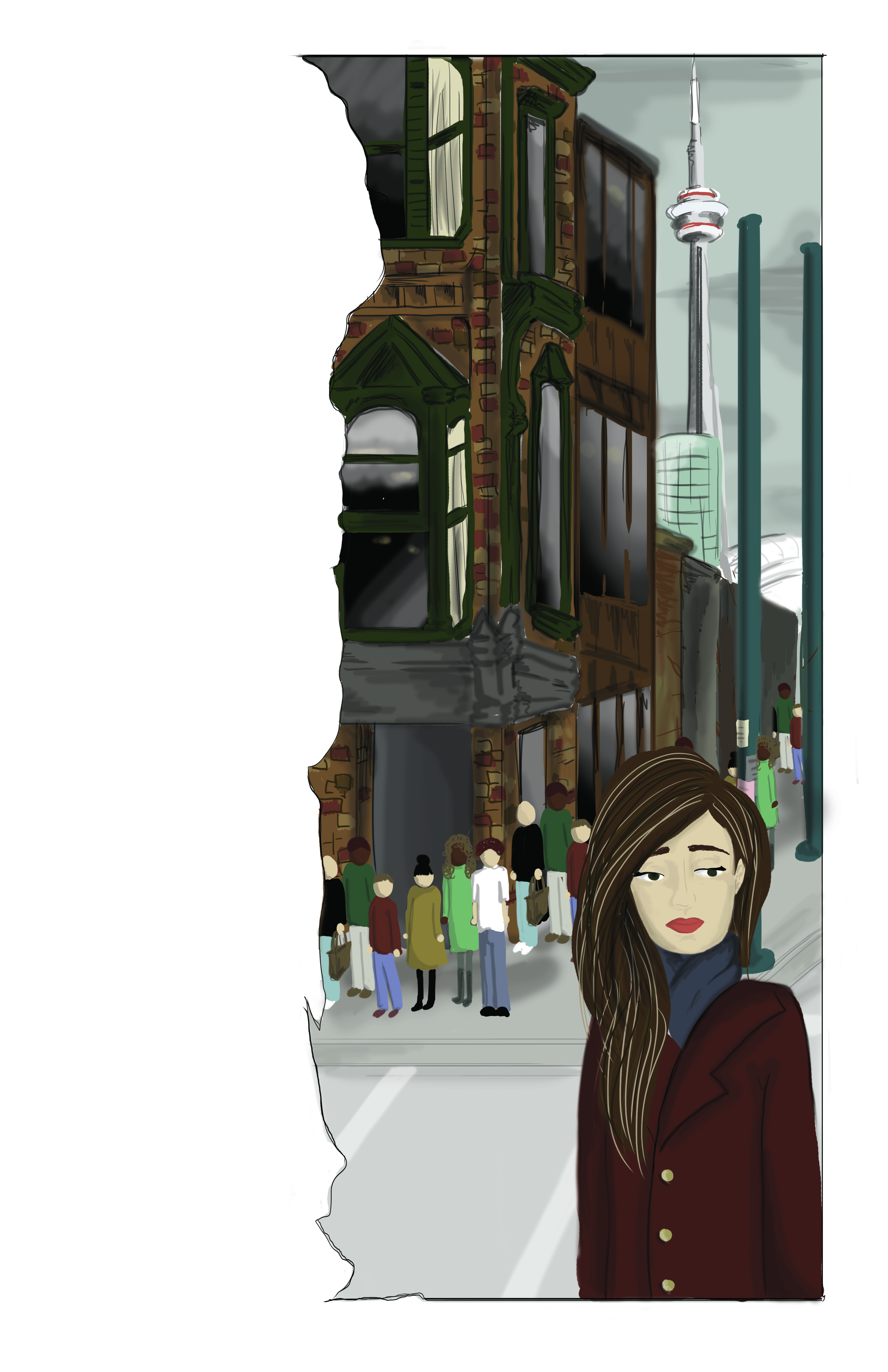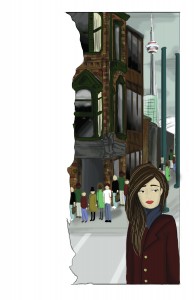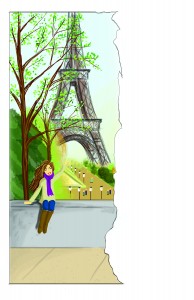When foreign becomes familiar


On Dec. 22, Michael Koziura looked out at the familiar form of Toronto’s CN Tower from the window of his plane as it dove into landing. There was a comfort at the sight of its spectacle, as there was in the casual greeting of a customs agent who welcomed him home with habitual Canadian regard at the gate. Shortly after, on Jan. 3, Caitlin McNeil enjoyed a similar landing in the city of Detroit, gazing out at blankets of snow instead of the stretches of pavement, damp with cold rain, that was definitive of her previous location.
Koziura, a fourth-year business major, and McNeil, a third-year French major, had just returned from their fall semesters in France and were experiencing a stage of reverse culture shock known as the tourist high. Home to the most partner schools within one country, France is an ever popular exchange destination through Laurier International and attracted 24 out of the 59 students to go abroad this past semester.
Michelle Adams, Laurier International’s Student Abroad Advisor, identified four stages in total. The first is a state of fluctuating emotions, ranging from excitement to anxiety, which occurs during the student’s preparations for return. The second, tourist high, is often joyous and overwhelming as students come face to face with old friends and family eager to hear all about their adventure. Shock then sets in after the freshness of return has worn off and loved ones step back into their normal routines while the person returning from abroad is left to do the same, except it is more like a giant leap with all that has happened since they last had a humdrum day at home.
“A lot of focus is on culture shock when they go away and they’re in a different country for their exchange, but actually most students feel it more when they return,” said Adams. The stages of reverse culture shock are similar to those that occur upon settling in a new country, but the tourist high stage is far more extensive abroad since the student is constantly seeing new things, having new experiences and meeting new people in their country of choice.
Koziura and McNeil even further extended their tourist high while in France through visiting various countries around Europe on their weekends. “That’s what exchange is all about; you’re not going there just to sit there and hangout in one country. Every Westerner, American or Canadian goes on an exchange in Europe to see Europe, and that’s what we did,” said Koziura. From bull fights and riots in Spain to soccer matches and flooding in Italy, Koziura took in whatever these countries threw his way. But there was a lot to see and experience in Paris as well around the Institut Supérieur du Commerce where Koziura was studying.
“I would walk to school at 8:30 in the morning and there would be people in suits drinking wine,” said Koziura. “It’s so vested in their culture, it’s ridiculous.” McNeil also noticed a similar pattern in her city of Tours where she attended Université François Rabelais. “There were different mentalities about drinking and how they eat their meals even,” she said.
When attending her weekly dinners at the residence of a local French family during her stay as a part of an integration program, McNeil noticed that having several courses was customary. There were appetizers to start, followed by a main course, a cheese dish and then, most importantly it seemed, desert. And, of course, the wine flowed steadily. But she found that the French never drank to excess, even at the bars or the clubs where Koziura said that anyone could carry on a fully comprehensible conversation at even the latest hour.
McNeil also noted that the roots of stereotypes were clarified during her stay, not only in regards to France but to her own country as well. “You’d walk down the street and pass like five people carrying baguettes under their arm. I even saw berets occasionally,” she said. “Also, stereotypically Canadians tend to say ‘please’ and ‘thank you’ a lot. I actually found that to be true over there.” In comparison to the sometimes exaggerated politeness of Canadians, both McNeil and Koziura found the French to be generally less considerate of their fellow person. “It’s a much more individualistic culture,” said Koziura. “Everyone kind of has their head down and worries about themselves.” This, he further discovered, was reflected in the education system.
At both McNeil’s and Koziura’s universities it was expected that students be largely independent when it came to their education, to the extent where there wasn’t a strong sense of community or even accessibility for the most part. However, this meant that their schedule was much less demanding and this made for a difficult adjustment upon returning to Laurier. “It’s a lot more stressful being back home; it’s a lot more difficult and a lot more involved,” said Koziura. But academic differences are only one of the many triggers that quicken the onset of shock as the most prominent stage of reverse culture shock.
Largely, students feel disconnected from their environment since they have likely gone through changes on a personal level while many of the people and components of their home life have remained the same. “I came back and I just slipped right back in, nothing had changed. It was the weirdest thing. I had spent four months away, I was traveling and I went on my own and I came back and nothing had changed at all,” McNeil said.
To have been constantly weaving through different cultures and meeting different people with a seemingly endless supply of things to discover and learn about each one, then to come to what feels like an abrupt halt, is sure to throw a person off balance. Students consequently find themselves wanting to relive their experiences through an outlet of some sort and often the most useful is their words. However, it can be hard for those listening to remain in attention when they are unable to relate.
“One of my really good friends went to Amsterdam and now we hang out all the time here and we genuinely get worried about talking about Europe too much and talking about exchange too much,” Koziura shared. “People eventually get bored of us sitting there talking about our last four months but there was so much to it. So it definitely is hard to relate back here.” Koziura is fortunate to have a friend at Laurier that is going through a similar experience having returned home from living in a similar country, but this is not the case with everyone.
In order to give returning students the opportunity to express some of what they are going through with others who are currently or have been in a similar situation, Laurier International put together a re-entry social last week that McNeil attended. “It helped a lot because I knew that I wasn’t the only one feeling the kind of things that I felt. A lot of other people experienced the fact that nothing had changed but they had, it was just kind of nice to talk about. It helped a lot, actually,” she said.
“We have a group of cultural ambassadors who also help to support the students,” said Adams. “They come to the re-entry social and they meet the students because they have all been in that situation before and they know what it’s like to go abroad and then come back to Laurier. So they’re a big support structure for them.” Adams recommended personally taking on the role of a cultural ambassador as she feels it is something that might help returning students cope with their reverse culture shock. “Just coming in and providing advice and your expertise to other students who want to go can sometimes help them relive their experience and talk to students who are interested in what they have to say,” she said.
Also, Adams suggested that getting involved at Laurier is often a good method, whether that’s joining an Irish dance club after spending the semester in Limerick or joining a French club after living in France. “At Laurier we’re so lucky because we have so many clubs here, there’s usually something you can join,” she said. In regards to Irish dance, this might have been beneficial for Laurier graduate Alanna McConnville who studied at the University of Limerick in Ireland during the fall semester of 2011-12.
McConville grew particularly attached to both the country and its people during her stay, largely due to her established Irish heritage but also because of the culture prevalent there. As a predominantly Catholic country, there is a large emphasis placed on community and family values. She found that this translated into university life as well, both on campus during the school week and on weekends when it was customary for students to return home and spend time with their loved ones.
This made for an unusual social scene as drinking would often take place throughout the week, but in regards to academics and campus life there were very few differences. “As far as the student life goes, it was very much like Laurier … strong sense of community, strong sense of school spirit,” said McConville. “For the most part the workload itself was the same. I found there were fewer assignments that weighed a lot more.”
These similarities made it slightly easier to manage her schooling upon return but she found it very difficult to make the transition as a whole. “You’re trying to distance yourself from what you got attached to and what you loved so much,” she reflected, “and then you’re trying to reconnect with something that you’re not yet ready to reconnect with.”

Although there are many immediate feelings of loss that follow an exchange, what a student has gained while away will last them a life time. For Koziura it was largely a new perspective in regards to his own country. “I really respect the Canadian lifestyle now; your Monday morning is a lot easier after seeing what a lot of people in the world go through. Our problems are so trivial compared to most. You gain that, you gain respect for what we are and who we are,” he said.
After also experiencing a language barrier that had him wandering the dark streets of a Parisian suberb one night in search of some way home, Koziura also feels that he’s taken on a greater sense of confidence in Canada. “I can walk up to anyone, any Canadian who speaks English, I can go up to them and start a conversation. Not that I wasn’t able to do that before but it’s a lot easier now.”
Although McConville spent her exchange in an English-speaking country, she still took a lot away from her interactions with the local residents with their biting humour and her fellow exchange students from their various backgrounds.“You meet such a diversity of people and you take that with you. I notice I interact with people much differently, much more comfortably, much more confident,” she said.
McNeil also feels that she has grown through her experience. “I feel that I’m a little more independent now,” she said. “It was my first time really being completely on my own and I did a lot of my traveling on my own as well.” Both Koziura and McNeil have been back on Canadian soil for over a month now and are working their way through the last stage of adjustment. “I think I got used to it quicker when I was going there, where as I was fine right when I got back and it’s kind of gotten harder as I go on,” said McNeil. “I’m pretty good now though, just really busy a lot of the time. I’ve been adjusting pretty well, I think.”
“Just as you adjusted out there you’re going to adjust here,” said Koziura. “But you’re going to miss it.” McConville can account for this as she continues to feel the effects of reverse culture shock even after so much time has passed. However, she ultimately believes that her gains outweigh her losses. “When you leave it, all you have left is what you carried with you. Your memories and your moments … they’re ingrained into you forever. You learn to feel less and less sad that it was over and more and more proud and happy and confident that you got to experience it.”


